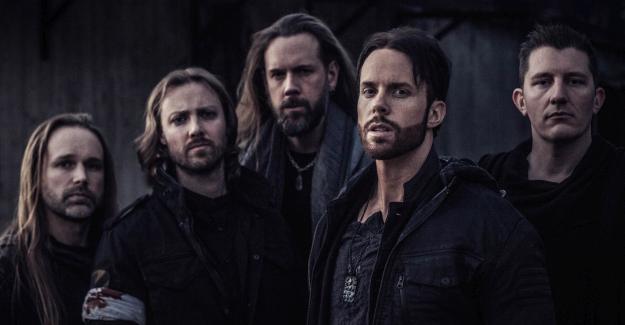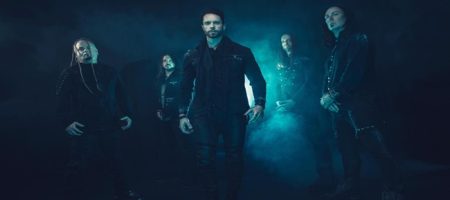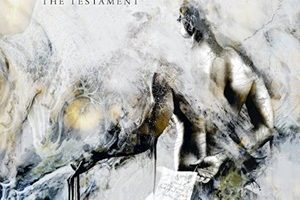Seventh Wonder – Journey to Tiara
Monday, 8th October 2018
When opportunity knocks, you usually have one shot to make that mighty impression. When Roy Khan decided to step away from worldwide symphonic power metal leaders Kamelot on the vocalist slot, the search was on for a new vocalist. Seventh Wonder singer Tommy Karevik would take over – meaning a bit of delay in activities with such band given the longer album/tour cycles for Kamelot. It’s been eight years since The Great Escape, the last Seventh Wonder studio album, but it’s not like the members have been idling their time away. As you’ll discover in this talk with bassist Andreas Blomqvist, it’s set themselves up for a strong return with the latest concept album Tiara.
Progressive metal with solid melodies and hook lines has always been a balancing act for the group – probably setting themselves apart from many acts who only bring out the fellow musician crowds studying fretboards and technique. Adventurous, thoughtful, and emotional resonance are all a part of the overall landscape for Seventh Wonder – and should allow the band a seamless return that their followers welcome. In this engaging talk with Andreas, we tackle the lengthy layoff, the multi-level storyline behind Tiara, the benefits of a singer in a higher profile second band, and some deep discussion on health care and possible future solutions.
Dead Rhetoric: Tiara is the fifth Seventh Wonder studio album, and first in eight years for the group. How does it finally feel to unleash some new material on the listeners, who’ve been patiently waiting all this time?
Andreas Blomqvist: It’s something that we have been looking forward to, longer than I can say. On and off there have been disappointments, where we thought that we would have something ready. We thought at first that we would have something out by the end of 2013, but there was too much going on in the Kamelot camp for that to make it at that point in time. Then we did the whole live thing, where we did the Mercy Falls album front to back live double CD/DVD from the United States and that took a while – then we got back to writing again. A lot of stuff happened back and forth, but we are super excited with the new material, and I can’t wait to hear what the people have to say about it.
Dead Rhetoric: Considering the lengthy time between releases, did you spend more time dialing in on specific aspects this time around that maybe you have always wanted to expand upon or focus within that you haven’t gotten to as much on the previous efforts?
Blomqvist: Maybe not on that high of a level, in the sense that now we have the time to pursue a new direction. I wouldn’t say that, but when we got back into writing after the live in Atlanta thing that was recorded in 2014, that’s when we decided to go for a concept album. So you end up having to be a little bit more deliberate when it comes to your writing, to go back and review some of the things that had already been written before that. In the context of a concept album, certain songs have specific roles. We have to spend a lot more time making sure a song that we write has the right feel and convey the right type of emotions for what we want to say, and that can take a little bit longer. You also end up spending a whole lot more time working on the lyrics than you would a normal album. We took the time to make sure that it would be a proper concept album. We did not go in the studio with the intention of making something that was dramatically different or pushing in a new direction from what we have been doing before. We stayed true to form, relating to the general sound of the music.
Dead Rhetoric: Can you delve into the lyrical concept this go around? Has it always been important for the band to spend an equal amount of effort and energy investment on the words to match up with the progressive metal style you perform within?
Blomqvist: For me personally since I always throughout the years even since demo times have handled most of the lyrics, it’s always been important. I enjoy working with it- and including Mercy Falls, which was a concept album too – we’ve never spent as much time working with the lyrics as we did this time. Usually it’s Tommy and I who handle things, and we decide who will write the lyrics for this song, who will handle that song – or do verse one and verse two separately. Whereas this time, we did every single line sitting down together, making sure we were really to the point with everything that we wanted to say. They’ve always been important to me – but it’s all the more important when (the lyrics) have such an important role to play. For a stand-alone song, it may not matter as much – but if you mess up on one song of a concept story, the whole thing can become unintelligible or people wouldn’t understand what’s going on. There’s certainly a lot more pressure to meet those demands.
The story takes place in modern times, maybe a few more years down the line. We always try to make a point of a story that can be interpreted on several different levels. In this case, you can see a science fiction story, or the religious themes, or maybe even a very hands-on, environmental approach. The more obvious storyline is something happens that puts everything on the edge. There’s a presence, or entity, that arrives to the Earth ‘the Everones’. They put humanity on trial for our crimes. Humanity is totally oblivious since we don’t understand at all- we cannot see our faults or any errors that we have committed. Instead we try to say we created art, music, technology, and how can this be bad? There is one person, Tiara- this young girl child, that really sees us the way that we are, by the Everones – and she makes everyone realize this. And after a while they come to this conclusion, and she helps the people understand that we are going to need her if we are going to make it out of this alive. Tiara is going to be sent off to kind of plead our case, or deal with these Everones. That’s what is depicted in the “Farewell” trilogy. I really wanted it to depict that departure from three different perspectives – people in general who are saved, her parents who are going to suffer a great loss, and in herself. That’s a key point in the story, and I’m just going to leave it to the listeners to figure out what happens after that point.
Dead Rhetoric: Did this make it a difficult process to decide what would be the first track (“Tiara’s Song”) to release to the public, given it’s a full concept record?
Blomqvist: Yes, a very good question. We struggled a lot with that. I don’t think that we’ve ever before on any album had less of a clear idea what song to throw out there. We debated, and we were all over the place. In the end we went for something, being gone for so long, we wanted it to be classic Seventh Wonder so that people wouldn’t be put off by something far more experimental. We wanted it to be us, a showcase of everyone and a song that we would be likely to play live- so those were the elements that went into deciding that. It took a while, but I’m pretty happy with the choice.
Dead Rhetoric: Obviously Tommy moving into the Kamelot vocal position in 2012 has slowed down some of the activity for Seventh Wonder – but have you seen the benefits worldwide in boosting the profile for the band because of their fans looking into his other work?
Blomqvist: Oh yes, sure- there’s definitely that. It’s hard to throw out a number, and especially since we haven’t been active in that time, it’s really hard to assess what impact that actually has. Just being active on social media, and seeing what messages people are writing us, and seeing the amount of Seventh Wonder shirts showing up at Kamelot shows, sure there’s definitely some of that going on. For the first time in our career, we have more female fans getting into us, it’s quite a change for us. Usually people are going to be there with notebooks and field binoculars looking at our fingers when we play arpeggios- this was our previous crowd and now it’s a more diverse crowd. It’s been both a blessing and a curse, for sure. A lot of people would have forgotten about us or given up on us without Tommy throughout these years rekindling interest in the band. At the same time, it wouldn’t have taken eight years if he was not in the band- so it goes both ways. In terms of our total following, I’m sure it’s been very beneficial for us.
Dead Rhetoric: What is your outlook on the bass and its role within Seventh Wonder – are there times where you know when to be more intricate and innovative versus laying back in the pocket and groove so to speak?
Blomqvist: I don’t think I’ve ever been an in the pocket player. The things that I do as ornaments above and beyond the chord being played, maybe those things have gotten a bit more tasteful – whereas on the first two albums I would play the biggest and fastest thing that I could when there was an opening. Maybe now I think I’m a little more tasteful in what I do. Our sound, and fortunately for myself and Johan (Liefvendahl) the guitar player – we are really in agreement with this that we want the sound to be more like Mr. Big or Talisman rather than Rammstein in the sense that we don’t want six layers of down-tuned, fat/heavy modern guitars, we want nice bass and guitar-driven… I wouldn’t say 50/50, but those two bands I named give you an idea of what we want the roles of bass and guitar to be in the band. That’s been in the concept since day one and I could not see myself in the band if that wasn’t the case.
Dead Rhetoric: Where do you see the state of the progressive metal scene today in comparison to when you originally started the band in 2000? Do you believe the proliferation of internet communities, social media, and worldwide festival opportunities have made things even more solid and stronger than ever?
Blomqvist: Yes, I guess. It’s so hard to talk on a high level about these things, I wouldn’t say I’m an expert even though I am 40 right now. Everybody is turning into geezers, and you realize that you start listening to the same stuff that you did many years ago. Maybe I’m not an expert in assessing the modern state of things. Pushing twenty years ago when we first started everybody was pushing to be Dream Theater and Symphony X, and I think that was the second generation of modern progressive metal. Circus Maximus came out of that, we did, and a bunch of other bands – so we all started there, and all these bands have found their own way.
Progressive metal, even though nobody has kind of stepped up and taken over the crown from Dream Theater- they still are the biggest band in that genre- there are more bands, less obscure and there are festivals devoted to this. It’s an amazing opportunity for small bands like us and other bands in a similar position to reach new audiences and actually get out and play. Given the deterioration of record sales and what not, for many bands it’s the only way for bands and promoters to put something together and feasible to get bands from across the world over like ProgPower festival in the USA. It’s impossible to not overestimate the impact they’ve had in giving bands a chance to play. It’s key to keeping the genre alive and stimulate new bands to get going.
Dead Rhetoric: What do you consider some of the strengths or unique traits that Seventh Wonder possesses that help you stand out in the scene?
Blomqvist: In the context of progressive music being a musician’s music if you will with a lot of key changes, tempo changes, intricate changes and all that good stuff- I think that we’ve always wanted to make sure that there were good songs. We’ve always said that if a song is good, you should be able to grab an acoustic guitar and sing it and it will be a damn good song anyway- and everything else is a bonus. To play something in 13/8 with offbeat, polyrhythmic signatures, and make it sound like a pop song- that’s something that I think is a really cool thing. Without tooting our own horn too much, I think that’s something we do really well. I want to take this opportunity to applaud Tommy for that, because the things that we throw at him are sometimes out of this world, so he’s a genius in that sense. That separates us from many bands, we didn’t get lost in technique and excess like that. It’s always about good songs- and from my perspective few other modern bands use the bass in the way that we do. Judging from mail (that) I get, people appreciate that and see it as something unique.
Pages: 1 2




























